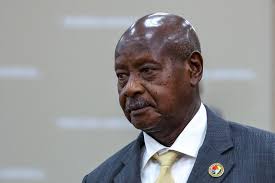Barely weeks after the deadly Gen-Z protest which swept Kenya in June, there are indications that Uganda may be within the radar of the mass of disullisioned young people fed up with the country’s ongoing crises blamed on official corruption.
Weeks of wildcat protests forced Kenyan president William Ruto to back down from introducing a controversial tax regime.
Over 50 people, mostly young people between the age of 17 and 35 were killed as Kenyan anti-riot police responded to the protests with a heavy hand.
Surging numbers of disgruntled youth in Uganda are also sensing blood and have issued a notice that they will take to the streets on Tuesday despite a threat to deal them a heavy hand coming from none other than President Yoweri Museveni.
After the Ugandan police’s refusal to issue a permit for the planned protest was met with a threat by its planners to go ahead with the march with or without permission, an air of uncertainty envelopes Uganda on Monday, barely 24 hours before the marchers are supposed to hit the streets.
President Yoweri Museveni eyeing what has been happening in Kenya with trepidation, issued a thinly-veiled warning that the demonstrators will be plucking their hands into the fire by going ahead with their planned protest which is meant to send a message against ramapant corruption state officials have not even bothered to deny.
The target of their protest is the country’s parliament where MPs will be urged to act with stiff legislation to stamp out corruption and what they call the politics of patronage which had come to be associated with the Museveni government.
Museveni in power since 1986, is the only president the Gen Z had known.
As they threatened to march on Tuesday, the president who turns 80 in September made it clear in a statement on state television that his leadership was in no mood to entertain trouble coming from the streets and warned that protesters will be seriously dealt with should they ignore his warning and take to the streets.
He said Uganda is taking advantage of a prolonged period of political and economic stability to create wealth for its people and any protest the likes of those which happened in Kenya will not be accepted to disrupt this arrangement.
”You are playing with fire because we cannot allow you to disturb us” he warned, accusing the leaders of the planned protests of being the tools of foreign forces bent on upending the gains registered by his leadership.
Corruption, the bane of their intended protest has been a burning issue in Uganda for months after parliamentary speaker Anita Among and two other ex Museveni aides were fingered in a scandal over graft.
In April Speaker Anita Annet Among and two other former ministers who worked under President Yoweri Museveni came under sanctions from the UK and US government.
UK Deputy Foreign Secretary, Andrew Mitchell announced sanctions on her and two other officials namely, Mary Goretti Kitutu, who was the Minister for Karamoja Affairs between 2021 and 2024 and Agnes Nandutu, who was the State Minister for Karamoja Affairs between 2021 and 2024.
Among was one of the most powerful and influential women in Uganda even before she became Speaker of the country’s parliament.
UK said the sanctions on the politicians followed corruption charges against them for ”stealing from the poorest communities in Uganda”.
The UK was applying the Global Anti-Corruption Sanctions regime on individuals involved in corruption in Uganda for the first time, subjecting them to travel bans and asset freezes.
According to the charges Mary Goretti Kitutu and Agnes Nandutu stole thousands of iron sheets used for roofing and infrastructure from a Ugandan government-funded project aimed at housing some of the most vulnerable communities in the region, providing them to prominent politicians and their families instead.
It is claimed that Among who has been Speaker since 2022 benefited from the proceeds.
Over 60% of people in Karamoja live in poverty and many suffer from the devastating impacts of drought and insecurity.
Deputy Foreign Secretary Mitchell, said the trio ”taking aid from those who need it most, and keeping the proceeds, is corruption at its worst and has no place in society”.
He said the Ugandan courts were on a right cause to rein in corruption by cracking down on politicians who seek to line their own pockets at the expense of people they are supposed to help out of poverty.
However, young Ugandans accused the government of lacking the political will to take punitive actions against the accused.
WN/as/APA


